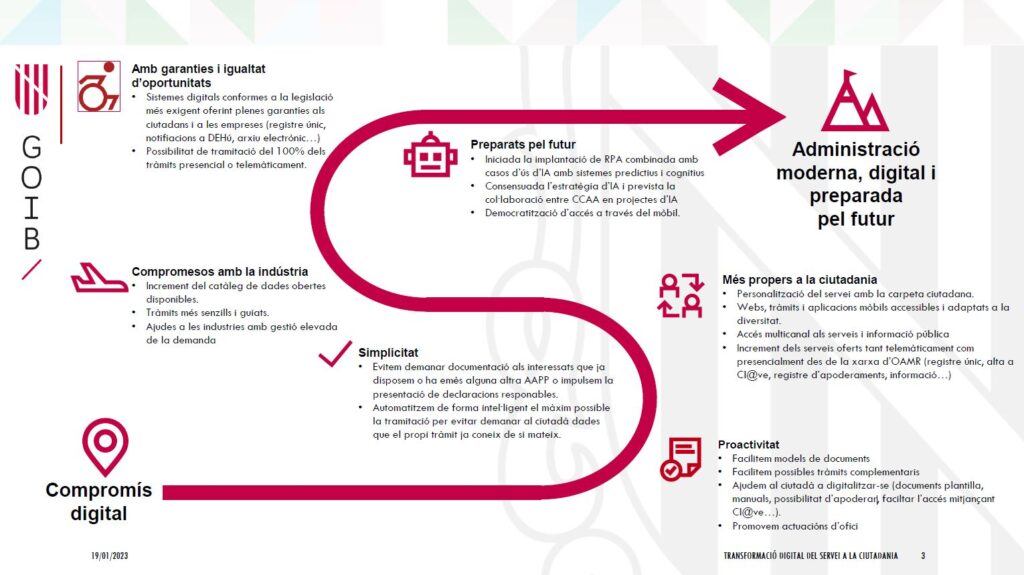Plan to increase the digital skills of the population
The Councillor for European Funds, University and Culture, Miquel Company, accompanied by the Director General of Modernisation and Digital Administration, Ramon Roca, presented the new version of the Citizen’s Folder that the Government is making available to all citizens to facilitate the telematic processing of administrative procedures carried out by the Administration of the Autonomous Community of the Balearic Islands.
TDB keeps you informed. Follow us on Facebook, Twitter and Instagram.
The new version of the Citizen’s Folder
The CAIB’s Citizen’s Folder is a virtual space where any citizen can consult their communications, procedures in progress, registrations made and personal contact details, as well as obtain supporting documents relating to procedures initiated or resolved, resume an unfinished procedure or provide required documentation.
As the councillor explained, the evolution of this project has been very significant in a relatively short period of time, incorporating functionalities progressively since it was launched in 2018. One of the most important is the total operability of mobile devices thanks to a mobile application that will soon be available for Android and IOS and that will allow receiving electronic notifications directly on the phone. This option is very relevant considering that studies on digital society show that 92% of the population surfs the internet mostly from mobile devices.
Data on access to the Citizen’s Folder reveal that this development has been very well received by citizens since it has gone from around 2,000 daily accesses when the first version was launched in 2018 to around 10,000 accesses that are currently registered on the busiest days. Most of the sessions registered have to do with the telematic processing of files, from users identified with a digital certificate and who access the Catalan version of the folder (around 70%).
“We had a major challenge in terms of electronic administration and we can say that the steps that have been taken over the last four years have had a really significant impact. We have increased the total number of procedures available online from 300, which accounted for 20% of the total catalogue, to more than 1,900. This means that the citizens of the Balearic Islands can carry out any procedure with the Government without leaving home, saving journeys, queues, appointments and paperwork …”, said Miquel Company.
Another parameter that demonstrates the progress of telematic relations with the Administration of the Autonomous Community of the Balearic Islands is the evolution of electronic notifications received by interested parties in the procedures, which have increased sixfold during this legislature, rising from around 7,000 electronic notifications per month to more than 42,000.
Communications between administrations through digital channels have also led to a considerable improvement in services to citizens, as it avoids them having to provide documentation or data that are already in the possession of another public administration. In 2018, the Autonomous Community of the Balearic Islands made some 200,000 telematic queries to other administrations for this purpose. The volume has been growing steadily since then and currently exceeds half a million queries per year (data up to the third quarter of 2022).
“This option, which allows us to interconnect administrations, is an advance that is highly valued by the population, as it saves many trips and procedures. Proof of this can be seen in the enormous amount of data and document consultations we carried out in 2021 during the processing of the huge volume of aid we made available to citizens to alleviate the effects of the COVID-19 pandemic. More than 1.8 million electronic consultations with other administrations saved beneficiaries unnecessary inconvenience”, added the councillor.
With regard to future challenges in terms of digitisation of the regional administration, the councillor announced a number of initiatives aimed at increasing the percentage of the population that uses electronic administration: a plan financed with European NextGeneration funds aimed at reducing the lack of digital skills in part of the population and a campaign that will be carried out by the Registry Assistance Offices to assist in the procedure for obtaining identification systems such as digital certificates or the Clave systems.
For his part, the Director General of Modernisation and Digital Administration, Ramon Roca, referred to other functionalities implemented with the aim of providing a more agile, simple and accessible service to citizens, such as the use of templates available to users to facilitate the start of procedures, the incorporation of the responsible declaration to eliminate documentation to be provided or the application of universal accessibility measures within the Citizen Folder, which has led to a significant improvement in the accessibility of this digital environment with a score of 7.71 points out of 10 at present.
The director general also emphasised other advantages offered by the digitisation of the Government’s administrative processes and the automated and strategic processing of the public data obtained. In this sense, the CAIB’s Open Data portal provides any citizen or company with aggregated and anonymised information of high-added value.
“We offer data that are of great use to many companies on the Islands, which integrate the information into their corporate portals to provide information to their customers or use it internally for decision-making. The number of monthly accesses to this portal has risen from 2,200 in 2020 to more than 27,000 today. By subject, most of them are about accommodation and tourist homes in Mallorca, followed by those related to COVID-19 data”, explained Ramon Roca.
Finally, Ramon Roca pointed out some of the projects being worked on, such as the robotic automation of processes, which, combined with the use of artificial intelligence, will allow, in the first phase, to automate the obtaining of information contained in digitalised documentation and presented on paper thanks to the processing of natural language and, in a second phase, to support decision-making based on data, and not only those associated with the processing of administrative files.

